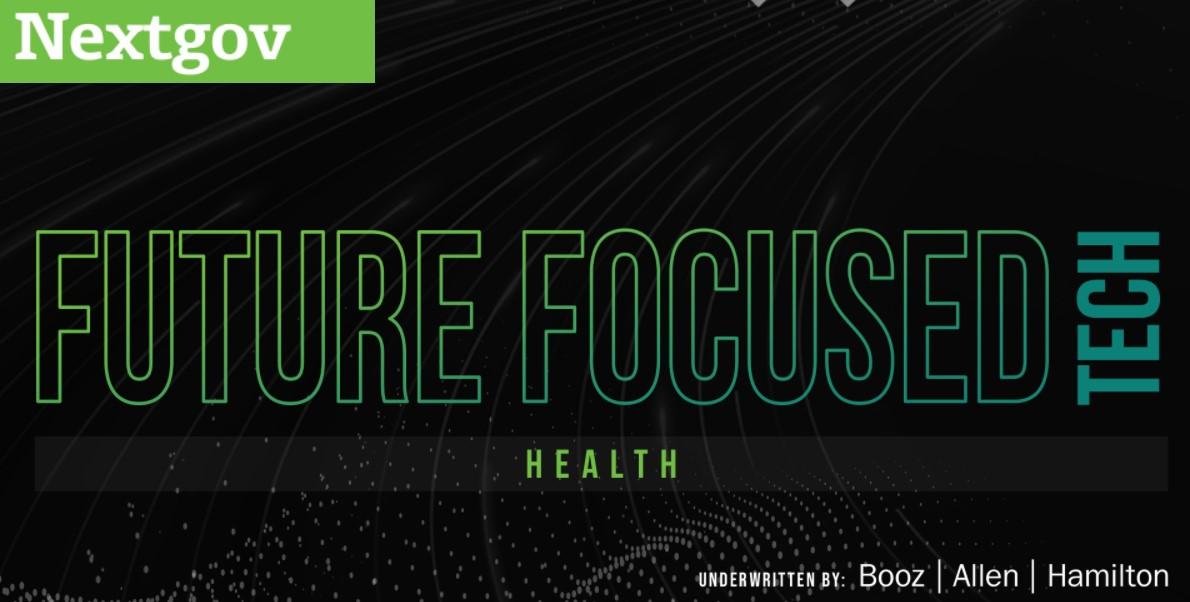DevOps, Data, and More: How Booz Allen and Federal Agencies are Modernizing Health IT During COVID and Beyond

Through modernization initiatives, federal health agencies are using the cloud, DevOps, artificial intelligence (AI), and more to serve their constituents. During COVID-19, these initiatives collecting critical data and delivering vital services were tested like never before. The changes in telehealth, contact tracing, and electronic health record systems were transformational, all while laying the foundation for the health care of tomorrow.
Future Focused Tech: Health, the first in a series by Nextgov and underwritten by Booz Allen, explored this changing and critical landscape. The virtual event brought together federal and leading institutional health IT leaders to share their stories, challenges, and advice.
Getting innovation into the hands of users—faster
While modern approaches and tools have accelerated application development, the delivery of software to production has not kept pace. Booz Allen Senior Vice President Jeff Fossum, who leads digital solutions at Booz Allen’s Charleston, South Carolina digital hub, talked about how DevOps is solving this problem at federal agencies.
DevOps streamlines the software delivery process by enabling an organization to deploy new features and fixes almost as quickly as they’re developed. Through DevOps tactics such as continuous integration and delivery, infrastructure as code, and automated testing, Fossum has seen organizations exponentially increase their annual deployments, shrink delivery times from weeks to hours, and deploy thousands of features into production with no downtime.
“Federal agencies are under pressure to increase the pace of mission impact and responsiveness to citizens. DevOps can accelerate these impacts,” Fossum said.
Keeping vital services on track for veterans
Fossum and his team at Booz Allen used DevOps as the foundation of the U.S. Department of Veterans Affairs (VA) Benefits Integration Platform (BIP), which allowed the VA to deploy software after every 2-week Agile sprint. This accelerated delivery enabled automation to reduce backlogged burial claims by 89 percent, the lowest number in its history.
The VA is a massive institution—the size of a Fortune 10 company, the second-largest federal agency, and the largest health care organization in the United States. Yet during the COVID-19 pandemic, it’s been able to keep operations running and its services ahead of demand, from student loan payments to health services to veterans’ benefits.
Deputy Chief Information Officer Brad Houston and Eddie Poole, executive director of solution delivery at the VA’s Office of Information Technology, joined the Nextgov event, speaking about the challenges and solutions involved in:
- Expanding virtual private network (VPN) remote access from 120,000 to 500,000 users
- Scaling telehealth usage by 1,800%
- Transitioning operations to the cloud
- Delivering four new systems – for fiduciary management, managing appeals, pensions, and memorials benefit management – over the course of just a year
- Accelerating the delivery of VA’s modernized architecture, to bring new capabilities online quicker
The biggest pain point so far was rapid engineering analysis and deployment to handle bursting and scaling, Houston and Poole said. What advice would they give to others? Anticipate an accelerated demand to retire legacy systems, as these “cement blocks” may hold back progress in terms of automation and systems integration. And for next steps, “follow the business,” and support users in whatever direction they go–which likely won’t be back to the old way of doing things.
Data-led innovations to combat COVID-19
How can we develop a shared, connected data ecosystem with real interoperability to present critical information? How can private industry and government innovate together to ensure hospitals have the information they need to fight COVID?
Joining the discussion was Sheri Lewis, global disease surveillance program manager at Johns Hopkins University Applied Physics Lab, where her team manages a global COVID-19 dashboard that takes pandemic data from around the world and presents it in real time. Lewis talked about how she and her team are working to standardize data collection and creating an easy-to-navigate data ecosystem that leverages analytics, AI, and machine learning for decision support.
Fellow speaker Dr. Susan Gregurick heads a comparatively new endeavor: The Office of Data Science Strategy at the National Institutes of Health (NIH). The organization coordinates, incentivizes, funds, and works to envision initiatives across the 27 institutes and centers of NIH to help researchers access and use data to answer their most pressing questions, such as COVID-19 risk factors, geographic differences, and long-term complications of the illness. The ultimate goal: create a truly connected data system that can harness data growing by the petabyte (each petabyte equals a million gigabytes) from hospital systems, social media, clinics, and more to answer compelling problems—during the COVID-19 pandemic and beyond.
Learn more about how Booz Allen is innovating across civil government and watch the full event recording.

